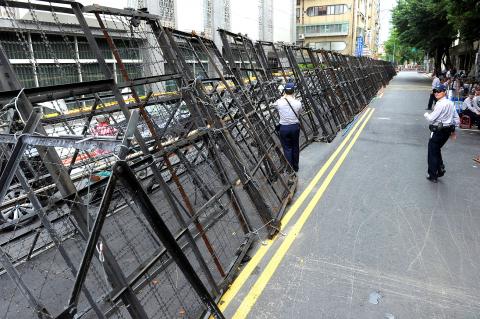A Ministry of the Interior proposal to use pre-emptive detention against protesters who have repeatedly broken the law during demonstrations yesterday came under fire from human rights advocates, who said that it could be a step toward restricting freedom of expression.
“The idea is ridiculous, because in a democracy it’s just normal for people to be out on the streets to voice their opinion,” said Frida Tsai (蔡培慧), spokeswoman for the Taiwan Rural Front, which has organized numerous street protests.
“Pre-emptive detention is designed for people who have actually committed a crime, not for people who are on the street to voice their opinion,” Tsai said.

Photo: CNA
She said that some protesters may have broken the law during demonstrations, but the police cannot assume that they will do the same in future demonstrations and detain them beforehand.
“I would like to remind the police that we are a democracy, and, as representatives of the state power on the first line, officers should always remember that their job is to serve the people,” she added.
Tsai was responding to a proposal made earlier this week by Deputy Minister of the Interior Jonathan Chen (陳純敬), who said that he would ask the police to keep an eye on “extremists” who have repeatedly engaged in unlawful conduct during demonstrations and to forward relevant information to prosecutors, making them potential targets for pre-emptive detention.
Calling the idea “absurd,” Taiwan Association for Human Rights president and lawyer Chiu Hsien-chih (邱顯智) accused the government of trying to suppress freedom of speech by threatening the public.
“Pre-emptive detention is commonly used against repeat offenders — and the Code of Criminal Procedure (刑事訴訟法) stipulates that the measure can only be used against offenders of specific crimes — to prevent them from repeating the crime. It is rarely used against protesters by governments around the world,” Chiu said.
“Moreover, I think it would be difficult for prosecutors to convince the judge to allow pre-emptive detention,” Chiu said.
Thomas Chan (詹順貴), a lawyer and long-time human rights and environmental activist, agreed, saying that he did not think pre-emptive detention could be used on protesters, since there is a set of strict regulations on how a person may be pre-emptively detained.

NATIONAL SECURITY THREAT: An official said that Guan Guan’s comments had gone beyond the threshold of free speech, as she advocated for the destruction of the ROC China-born media influencer Guan Guan’s (關關) residency permit has been revoked for repeatedly posting pro-China content that threatens national security, the National Immigration Agency said yesterday. Guan Guan has said many controversial things in her videos posted to Douyin (抖音), including “the red flag will soon be painted all over Taiwan” and “Taiwan is an inseparable part of China,” while expressing hope for expedited “reunification.” The agency received multiple reports alleging that Guan Guan had advocated for armed reunification last year. After investigating, the agency last month issued a notice requiring her to appear and account for her actions. Guan Guan appeared as required,

A strong cold air mass is expected to arrive tonight, bringing a change in weather and a drop in temperature, the Central Weather Administration (CWA) said. The coldest time would be early on Thursday morning, with temperatures in some areas dipping as low as 8°C, it said. Daytime highs yesterday were 22°C to 24°C in northern and eastern Taiwan, and about 25°C to 28°C in the central and southern regions, it said. However, nighttime lows would dip to about 15°C to 16°C in central and northern Taiwan as well as the northeast, and 17°C to 19°C elsewhere, it said. Tropical Storm Nokaen, currently

‘NATO-PLUS’: ‘Our strategic partners in the Indo-Pacific are facing increasing aggression by the Chinese Communist Party,’ US Representative Rob Wittman said The US House of Representatives on Monday released its version of the Consolidated Appropriations Act, which includes US$1.15 billion to support security cooperation with Taiwan. The omnibus act, covering US$1.2 trillion of spending, allocates US$1 billion for the Taiwan Security Cooperation Initiative, as well as US$150 million for the replacement of defense articles and reimbursement of defense services provided to Taiwan. The fund allocations were based on the US National Defense Authorization Act for fiscal 2026 that was passed by the US Congress last month and authorized up to US$1 billion to the US Defense Security Cooperation Agency in support of the

PAPERS, PLEASE: The gang exploited the high value of the passports, selling them at inflated prices to Chinese buyers, who would treat them as ‘invisibility cloaks’ The Yilan District Court has handed four members of a syndicate prison terms ranging from one year and two months to two years and two months for their involvement in a scheme to purchase Taiwanese passports and resell them abroad at a massive markup. A Chinese human smuggling syndicate purchased Taiwanese passports through local criminal networks, exploiting the passports’ visa-free travel privileges to turn a profit of more than 20 times the original price, the court said. Such criminal organizations enable people to impersonate Taiwanese when entering and exiting Taiwan and other countries, undermining social order and the credibility of the nation’s